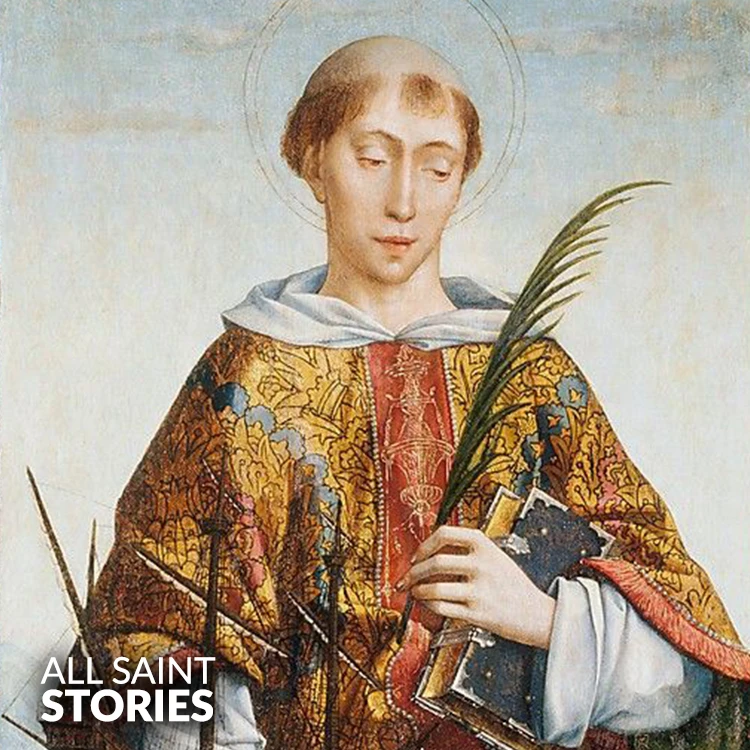"Saint Vincent of Saragossa, faithful servant of God, intercede for us in our time of need. Grant us strength to endure trials, courage to remain steadfast in faith, and the grace to follow Christ with unwavering devotion. Through your example of courage and service, may we be inspired to live with love and compassion. Amen."
ST. VINCENT SARAGOSSA
ST. VINCENT SARAGOSSA

St. Vincent of Saragossa was a 3rd-century Christian martyr and deacon. Born in Zaragoza, Spain, he is remembered for his steadfast faith and courage during the persecution of Christians under Roman Emperor Diocletian. Vincent’s martyrdom and legacy as a protector of sailors, winemakers, and vinegar makers have made him a popular patron saint. He died in 304 AD, and his feast day is celebrated on January 22.
St. Vincent of Saragossa, often referred to as Vincent of Zaragoza, was a deacon and a courageous martyr during the early Christian period in Spain. Born around 284 AD in the region of Saragossa (modern-day Spain), he grew up in a Christian family and took on the role of a deacon within the local church. This was a period of intense persecution of Christians under the Roman Empire, particularly under Emperor Diocletian.
Vincent was a trusted deacon who was known for his piety, generosity, and service to the Christian community. His role in the church was essential as he assisted the bishop of Saragossa, Valerius, in carrying out the administration of the sacraments and distributing alms to the poor. However, the peaceful and humble existence of Christians did not sit well with the imperial authorities, and when Emperor Diocletian launched a widespread persecution of Christians, Vincent became a target.
Vincent, along with his bishop, Valerius, was arrested for their Christian faith. They were brought before the Roman authorities, where Vincent was interrogated. He was accused of spreading the Christian faith and was ordered to renounce his beliefs. Despite the threats of torture and death, Vincent steadfastly refused to deny his faith. His unwavering commitment to Christ led to brutal tortures that included being beaten and exposed to harsh conditions.
The Roman authorities sought to break Vincent's spirit through these tortures, but he endured them with remarkable patience and courage. According to legend, after many days of torment, Vincent was executed by beheading. His martyrdom was a witness to the strength of his faith and served as an inspiration for many early Christians.
St. Vincent of Saragossa’s death in 304 AD marked the ultimate sacrifice for his beliefs. Following his martyrdom, his body was buried in Saragossa, where it became a site of pilgrimage. Over the centuries, his veneration grew, and he was recognized as one of the most revered Christian martyrs.
Vincent's patronage of sailors, winemakers, and vinegar makers stems from his association with these trades in early Christian Spain. It is said that he provided spiritual protection for those who worked on the seas or with wine, which were important industries in the region. His feast day, January 22, continues to be celebrated by Christians around the world as a day to honor his sacrifice and devotion to the Christian faith.
St. Vincent was never formally canonized, as he was already recognized as a saint by the early Christian community due to his martyrdom. His life serves as an example of unwavering faith and dedication to Christ, even in the face of intense persecution. His story is a reminder of the strength that can be found in faith, and he remains a source of inspiration for many to this day.
Video Not Found
The information on this website is compiled from various trusted sources. While we aim for accuracy, some details may be incomplete or contain discrepancies.
If you notice any errors or have additional information about this saint, please use the form on the left to share your suggestions. Your input helps us improve and maintain reliable content for everyone.
All submissions are reviewed carefully, and your personal details will remain confidential. Thank you for contributing to the accuracy and value of this resource.
Credits & Acknowledgments
- Anudina Visudhar (Malayalam) – Life of Saints for Everyday
by Msgr. Thomas Moothedan, M.A., D.D. - Saint Companions for Each Day
by A. J. M. Mausolfe & J. K. Mausolfe - US Catholic (Faith in Real Life) – Informational articles
- Wikipedia – General reference content and images
- Anastpaul.com – Saint images and reflections
- Pravachaka Sabdam (Malayalam) – Saint-related content and insights
We sincerely thank these authors and platforms for their valuable contributions. If we have unintentionally missed any attribution, please notify us, and we will make the correction promptly.
If you have any suggestion about ST. VINCENT SARAGOSSA
Your suggestion will help improve the information about this saint. Your details will not be disclosed anywhere.
© 2026 Copyright @ www.allsaintstories.com






 English
English
 Italian
Italian
 French
French
 Spanish
Spanish
 Malayalam
Malayalam
 Russian
Russian
 Korean
Korean
 Sinhala
Sinhala
 Japanese
Japanese
 Arabic
Arabic
 Portuguese
Portuguese
 Bantu
Bantu
 Greek
Greek
 German
German
 Dutch
Dutch
 Filipino
Filipino